Hijab Enforcers Deployed At Tehran University
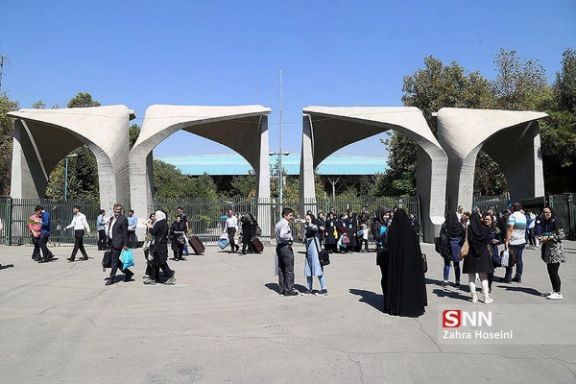
The University of Tehran's President Mohammad Moghimi has officially confirmed the increased presence of hijab enforcers at the capital's campus.

The University of Tehran's President Mohammad Moghimi has officially confirmed the increased presence of hijab enforcers at the capital's campus.
He said women, "with seminary education," organized into "monitoring groups for students' hijab" are now on the university campus.
Moghimi disclosed the development during a session of the Council for Promotion of Virtue and Prevention of Vice at the university.
He explained that the groups, comprised of women focused on “improving compliance with behavioral codes, are tasked with monitoring and enhancing the adherence to dress codes in alignment with religious rules, university regulations, and standards across all campuses of the University of Tehran.”
Critics argue that the presence of such groups raises questions about individual freedoms and privacy on university campuses, which have been hotbeds for anti-regime sentiment since last year's Women, Life, Freedom movement saw uprisings swell across the country.
The issues first came to light earlier this month when student councils in the country reported the presence of "hijab enforcement" forces in the University of Tehran's campuses, detailing instances of harassment and intimidation by the forces, who patrol the university campus under the pretext of enforcing dress codes.
Student councils also revealed that within a week, more than 50 students were summoned to disciplinary committees by the hijab enforcement forces. The majority of the students faced a range of penalties, from verbal reprimands to suspension from their studies as has been since since the uprising began last year and hijab crackdowns toughen.
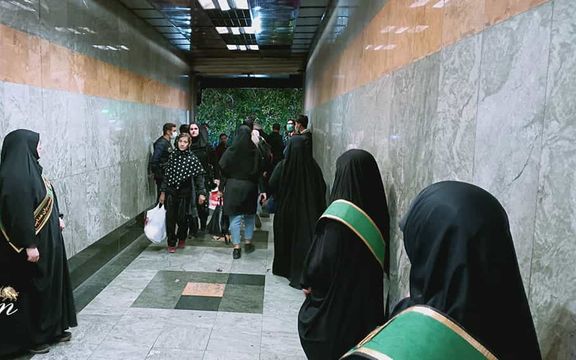
Political activist Abbas Abdi has slammed the recent deployment of police and hijab patrols in Tehran's metro stations, aiming to enforce mandatory hijab regulations.
In a Monday editorial for Etemad newspaper, the reputable reformist commentator and journalist expressed deep concern over the situation, asserting that “the increased police presence in the metro only serves to heighten public discontent.”
In recent months the regime has hardened its stance over the hijab as the strength of rebellion fails to weaken.
Abdi emphasized that the onus is on the government to align itself with the expectations of the people and work towards a more harmonious coexistence. Images circulating on social media depict numerous hijab officers creating congestion in a subway passageway at Tehran's Enghelab station, now colloquially referred to as the "horror tunnel" for women.
Reports also highlight the use of cameras by the Security Police (FARAJA) to identify women without headscarves. Abdi reposted an image of the hijab enforcers on the X social network on Friday, cautioning that the regime would likely face regrettable consequences for its decisions.
The stringent enforcement of hijab rules gained momentum following the tragic death of Iranian-Kurdish woman Mahsa Amini in hijab police custody in September 2022, igniting the Women, Life, Freedom protests. In May, Tehran Mayor Alireza Zakani announced the implementation of a uniformed security unit to prevent women from accessing metro ticket gates.
Reports in August suggested that Tehran municipality was planning to deploy 400 personnel to enforce hijab laws at subway stations in the capital. The heightened presence of hijab police also led to the death of Armita Geravand, 16, who lost her life in October following an encounter with Tehran's hijab police in the subway, in echoes of the Mahsa Amini tragedy one year earlier.
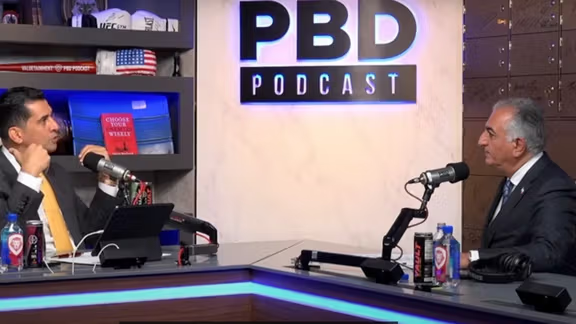
Iran’s exiled prince Reza Pahlavi has revealed that his father Mohammad-Reza planned to pass the throne to him just before the monarchy fell in the 1979 revolution.
In a three-hour interview with entrepreneur and best-selling author Patrick Bet-David -- himself of Iranian Assyrian and Armenian origin -- Pahlavi said when his father, the last shah of Iran, knew about his cancer he wanted his son to succeed to the throne but his aspiration was eclipsed by the emergence of a leftist-religious revolution that altered the course of Iran’s history.
The former crown prince, who has long campaigned for a secular and democratic Iran rather than a restoration of the monarchy, has a large fan base in Iran and abroad. During the Women, Life, Freedom protests – ignited by the death in custody of 22-year-old Mahsa Amini in September 2022 -- Pahlavi became a leading opposition figure, but he has critics among other dissident activists who do not see him as the leader of the opposition.
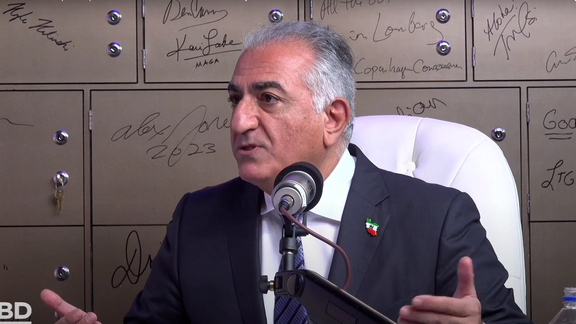
Despite at least four decades of Islamic Republic propaganda to indoctrinate Iranian children and youth against the Pahlavis, Iran’s last dynasty is still revered among Iranians, who chant slogans to honor the two Pahlavi kings who reigned in the 20th century during gatherings and rallies. Reza Pahlavi enjoys support thanks to his hereditary gift, among middle aged and older Iranians, but also he is popular among the Mahsa Generation Z youth, who see him touring the world to make the voices of Iranians heard and talking about transitioning from the Islamic Republic.
Asked about if he would consider running for a position in Iran after the collapse of the Islamic Republic regime, Pahlavi emphasized that the Iranian people are the ones who should decide on the future form of the government. “In order for people to be empowered, they have to have more than hope. They have to actually believe that it can be done. I believe that it can be done.”
He argued that most Iranians share Western values and the Islamic Republic is the obstacle on Iran’s path to connect to the global community. “We (Iranians) are your allies in principle” as a democracy seeking country. He asserted, “how many democracies do you know that go to war against one another?” He argued that Iran after the Islamic Republic is a country that the world can count on as a flagbearer of peace rather than an instigator of conflicts.
Questioned by Bet-David about how he sees the colossal challenge of overthrowing clerical rule, Pahlavi said, “There was a time I didn’t think that I would possibly see the fall of the Berlin Wall in my lifetime.”
The interview was the first time Pahlavi defended some of the policies of his father, tacitly trying to vindicate the last monarch and his notorious intelligence agency SAVAK. The secret police, domestic security and intelligence service, operated from 1957 until prime minister Shapour Bakhtiar ordered its dissolution during the climax of the 1979 Iranian Revolution. Pahlavi argued that many of the prisoners held by SAVAK were among thousands of Soviet KGB agents active in Iran. He charged that Iran’s current ruler Ali Khamenei was among such prisoners who had undergone training under KGB in Palestinian camp in Lebanon.
Pahlavi also talked about how the US government at the time helped the Islamic revolutionaries topple his father while Bet-David showed a video of a debate in which former US President Ronald Reagan criticized Jimmy Carter for undercutting Mohammad-Reza Shah Pahlavi. The prince also talked about his meeting with Carter and his National Security Advisor Zbigniew Brzezinski in 1978 at the White House. According to Pahlavi, the US politicians believed the establishment of an Islamic government in Tehran can stop the spread of Communism in the region.
Asked about why Iranians revolted against his father, he said the country was progressing toward a modern era “too fast,” explaining that the advances were rejected by the clergy who were conservative about any change in the social structure of Iran. “All of a sudden you find a country, where the income per capita jumps to the level it was, and people’s purchasing power made them capable of having so much more... and then you have the resistance coming from the clergy who never liked where my father was taking the country.”
Now Iranians have the lowest purchasing power unprecedented in history while women and minorities are persecuted,and Iran is far from the goals of Iran’s monarchs who believed the country would take its place among the top five countries of the world.
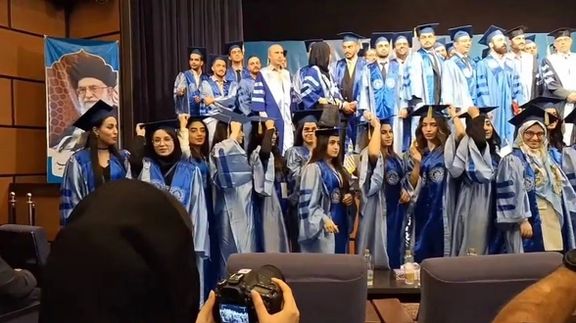
The chancellor of a university on Iran's Kish Island has reportedly resigned following a graduation ceremony where female students appeared without head-coverings, defying hijab rules.
Photos and videos published on social media showed the majority of girls at a small graduation ceremony on Kish Island's international campus of Sharif University of Technology wearing graduation hats with their hair flowing over their shoulders instead of covered with headscarves.
In a publicly released letter to the university's board of trustees on Saturday, Ali Selk-Ghaffari, the university's chancellor, offered his resignation. He referred to the girls' action as "outside [accepted] norms" and expressed regret that some alumnae had not complied with "academic regulations and dignity."
Kish Island, off the southern coast of Iran in the Persian Gulf with a population of around 40,000, is a free trade zone and a very popular destination of tourists. The international campus of Sharif University of Technology, one of Iran's most prestigious universities, has around 900 students.
The girls' bold defiance of compulsory hijab has angered pro-establishment media and social media users, leading to criticism of authorities for perceived lapses in enforcing hijab rules.
In a statement on Saturday, the public relations department of Sharif University of Technology reported that the chancellor and educational deputy of the university refused to stay in the ceremony until the end and left the venue due to observed violations of hijab rules during the awards ceremony.
In its statement, the university apologized to the “esteemed families of martyrs, veterans and all who are devoted to the Islamic Republic” and vowed to take serious and immediate action against those who defied the rules as well as others whose carelessness caused the incident.
Graduation ceremony without hijab is disdaining the existence of the Islamic Republic! From the south to the north of the country, from the east to the west, progressive students have taken sleep from the eyes of the [regime] criminals, oppressors and bullies!,”Daneshjooyan-e Pishro (Progressive Students), a loose network of dissident students which has been active in various universities since 2019, tweeted about the incident.
Other student groups have also welcomed Sharif University’s defiance of hijab at their graduation ceremony. A student newsletter run by dissident students at Tehran’s Amirkabir University of Technology called their move “civil disobedience”.
Since Mahsa Amini’s death in custody after being arrested for what morality police considered as “unfitting hijab” in September last year which sparked several months of protests across the country, particularly in universities, defiance of hijab has hugely grown in the Islamic Republic.
In recent months authorities have adopted a strict initiative to enforce the hijab rules at any cost including measures such as impounding cars if passengers defy the hijab rules, shutting down businesses such as cafes, restaurants, and shopping malls, and banned hijab-defiant celebrities from acting in films.
In October authorities revoked the medical license of a female surgeon in Amol in northern Iran after she appeared at a public awards ceremony on Doctors Day without wearing the hijab. Dr Fatemeh Rajayi-Rad was forced to appear in full hijab on state media and apologize for causing offense.
In another instance, the CEO of a prominent pharmaceutical company, Haleh Hamedifard, who had a headscarf on, was denied entry to the health ministry to attend a meeting with the officials because hijab enforcers stationed at the ministry said the tunic she had worn over trousers was too short.
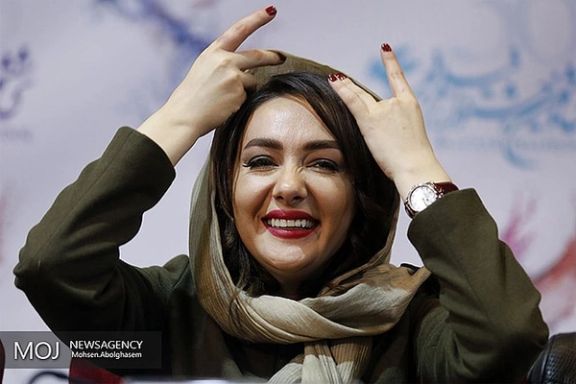
Iranian actress Hanieh Tavassoli has been handed a six-month prison sentence for content shared on social media amidst worsening crackdowns.
The charges against her include "publishing false information with the intent to disturb public opinion." The prison sentence has been suspended for three years, as conveyed by the lawyer.
Speaking in an interview with the semi-official news agency ISNA on Sunday, her legal advisor, Maryam Kian Ersi, detailed that Tavassoli is also obligated to pay a fine of 150 million rials (approximately 300 USD).
Tavassoli, who was apprehended at her residence in September, has since been released on bail. The arrest was linked to content shared on her social media accounts, particularly a tribute to Mahsa Amini, who tragically lost her life in morality police custody. The incident coincided with national protests commemorating the one-year anniversary of Amini's death.
Several weeks preceding her arrest, Tavassoli took to Instagram to express her views, indicating a perceived decline in religious authority and clerical influence in Iran. She emphasized the necessity for Iranian cinema to align itself with the "intelligent, rebellious, and courageous youth and society of today."
Tavassoli joins a growing list of celebrities, athletes, and public figures who have faced arrests and penalties for expressing anti-regime sentiments online. Consequences have included job losses, travel bans, and frozen bank accounts.
Since the death of Mahsa Amini in September 2022, anti-regime demonstrations have witnessed a widespread rejection of the mandatory Islamic head covering, known as hijab. The symbolic protest serves as a collective expression against the enduring power consolidation of the clerical establishment in Iran since the 1979 revolution.
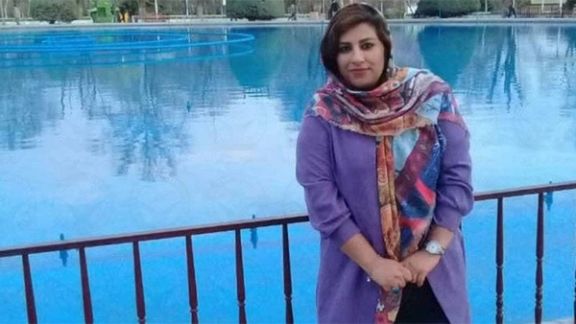
Political prisoner Mahboubeh Rezaei, has reacted to her 26-year jail term in Evin Prison under charges of undermining national security with a vow to continue her activism.
Following her sentencing, she said: "Whether in prison or outside, I will continue my path alongside the Iranian people, and I will not cease my efforts until the freedom of our homeland."
Last week, peaceful activists Rezaei, Samaneh Norouz Moradi and Reza Mohammad Hosseini, were collectively sentenced to a total of 61 years and 10 months by Branch 28 of the Revolutionary Court in Tehran. Their charges included "membership in opposition groups aiming to undermine national security."
The issued verdict states that if the sentence is confirmed in the appeals court, the enforceable part would be 7 years and 9 months for Mahboubeh Rezaei and Reza Mohammad Hosseini, and 6 years and 3 months for Samaneh Norouz Moradi.
In her letter, the political prisoner proudly announced, "Although my youth is spent in prison, I am not disheartened. Love for our homeland has rendered the prison's anxieties meaningless and has kept hope alive more than ever. In Evin Prison, I will be alongside other sisters and brothers who are fighters for freedom."
Mahboubeh Rezaei was first detained in May 2017 and was released from Adelabad Prison of Shiraz in June 2022. During her previous incarceration, she was exiled to Bushehr Prison, south of Iran and later returned to Shiraz after nine months.
In 2021, while in Bushehr Prison, she spoke about the assault on female prisoners in an audio message, and a few days later, her phone access was temporarily cut off.